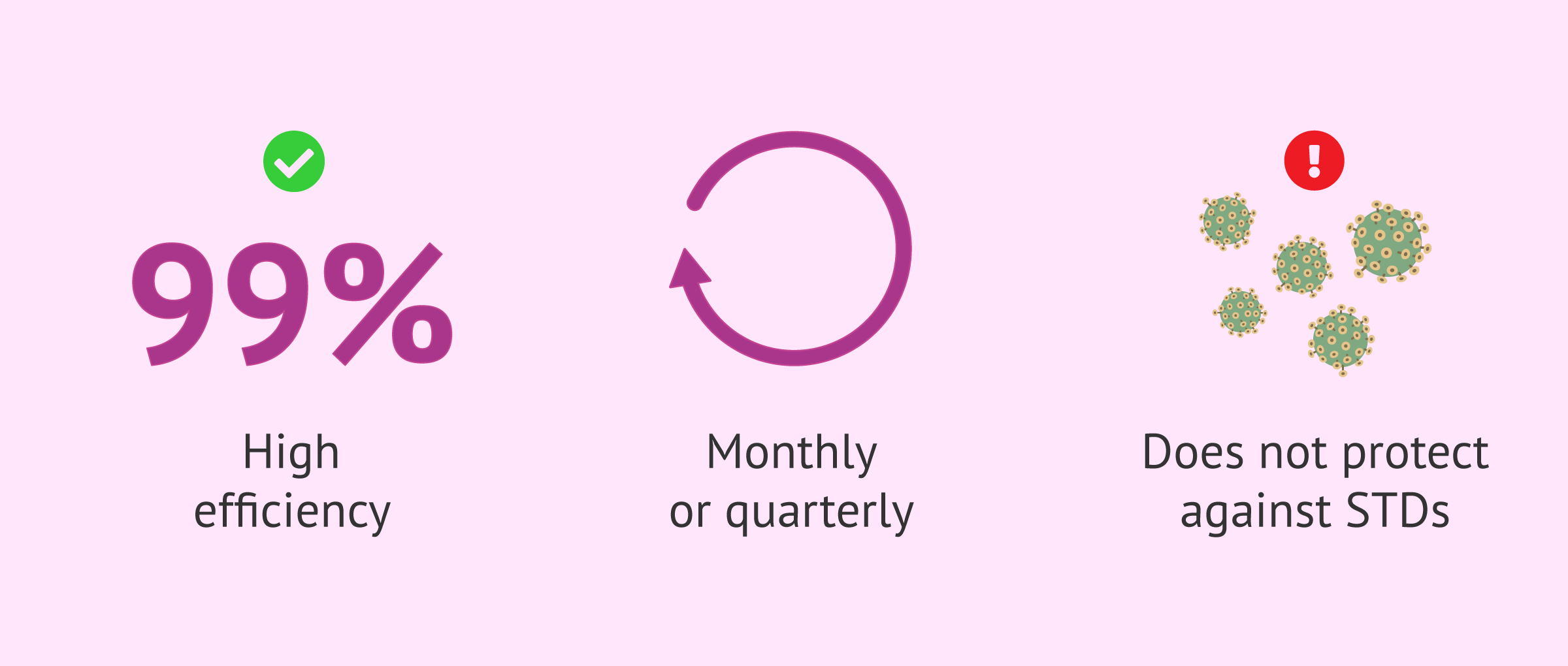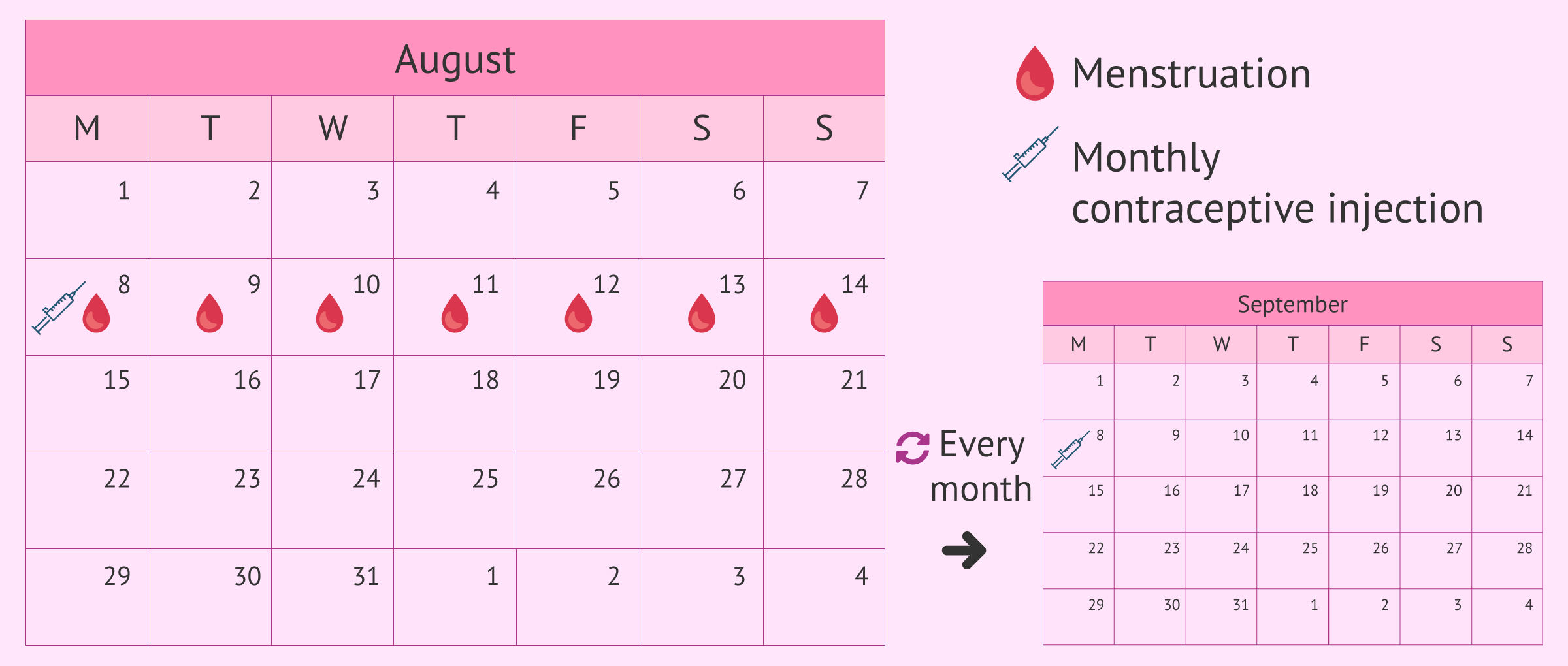The contraceptive injection is an injectable contraceptive method containing hormones, which may vary according to the type of injection. Thus, the monthly injection is composed of estrogen and progesterone, while the quarterly injection contains only progesterone.
In any case, it is important to consult with the specialist if this contraceptive method is the most indicated for the woman since it offers a series of advantages, but it also presents certain adverse effects and inconveniences.
Provided below is an index with the 9 points we are going to expand on in this article.
- 1.
- 1.1.
- 2.
- 2.1.
- 2.2.
- 2.3.
- 3.
- 4.
- 4.1.
- 5.
- 6.
- 6.1.
- 6.2.
- 7.
- 8.
- 9.
What is the contraceptive injection?
The contraceptive injection is an injectable hormonal contraceptive method, with an efficacy of 99% if used correctly. It is an injection, usually intramuscular, which must be given every month or every three months (depending on the type of hormones included), so it can be considered a practical and effective contraceptive.
This contraceptive method must always be indicated by a physician to ensure that it is the most appropriate for the woman. In addition, the specialist must previously evaluate that the woman does not suffer from any condition for which the administration of this injection is contraindicated.
On the other hand, it is important to know that the contraceptive injection does not protect against sexually transmitted diseases (STDs). Therefore, to avoid the transmission of STDs, it is necessary to use a condom during every sexual intercourse.
What types are there?
There are two main types of injectable contraceptives. Thus, the contraceptive injection can be:
- Monthly: it is combined, that is, it contains both estrogens and progesterone.
- Quarterly: contains only progesterone and is generally the most commonly used.
Thus, a woman can be protected from unwanted pregnancy for one to three months, depending on the type of injectable contraceptive administered.
The contraceptive action of the injection is based on preventing ovulation and making it more difficult for sperm to pass into the uterus by thickening the cervical mucus.
How to use injectable contraceptives?
Most commonly, the contraceptive injection is administered by a specialist in consultation. However, it is possible that in some cases the woman may be explained how to do it correctly and administer the injection herself at home, although this is not ideal.
Monthly injection
The first application of the monthly injection is usually done between the first and fifth day of menstruation. It may be advisable to use a condom in the 7 days after the injection, depending on the situation of each woman, so you should consult a specialist about this.
Subsequently, the woman will only need to have a new injection 30 days later, regardless of when her next period is due. Thus, it is usual that the injection is always administered on the same day of each month (August 8, September 8...)
Quarterly injection
The quarterly contraceptive injection is usually given between the first and fifth day of the cycle. Similarly, it may be advisable to use a condom if the woman has sexual intercourse in the 7-14 days following the injection, for which she should consult a specialist.
For the following, it is important to remember to administer a new quarterly injection 12 weeks later (regardless of the date of the menstrual period). In this case, it is also customary to do it on the same day of the month, but three months later (August 8, November 8...)
What to do in case of forgetfulness?
For this contraceptive method to be effective, it is necessary to administer the injections on the indicated date. However, there are a few days' margins, which may vary depending on the injection used.
If a woman forgets to take an injection and more time elapses than recommended, there is a risk of pregnancy if sexual intercourse has taken place. In this case, it is best to consult with the specialist about the different options and about the best time to apply a new injection. However, it will be necessary to check beforehand whether or not gestation has occurred.
Benefits of the contraceptive injection
In addition to being an effective contraceptive method, the contraceptive injection can offer other advantages to women who use it:
- Reduction of menstrual pain and discomfort.
- Reduction of menstrual bleeding and its duration.
- Improvement of premenstrual syndrome.
Finally, because of its monthly or quarterly mode of administration, the contraceptive injection can be very useful if a woman frequently forgets to take a daily oral contraceptive.
Contraceptive injection side effects
The most common side effects of the contraceptive injection are those that affect menstruation. After the injection, it is common to experience lighter and shorter bleeding, irregular bleeding, longer bleeding or even no menstruation.
It can also be common for women using this method of contraception to present:
- Headaches (cephalalalgia).
- Nausea.
- Abdominal pain and swelling.
- Weight gain.
- Breast tenderness.
- Affect on mood.
These side effects are usually temporary and gradually diminish. These generally occur during the first few times this hormonal contraceptive method is used, until the woman adapts to it.
In any case, a doctor should be consulted immediately in case of severe abdominal pain, fever, or any other symptom that worries the woman. In addition, it is very important to go as soon as possible in case of symptoms of a blood clot, such as chest pain, shortness of breath, severe leg pain, sudden loss of vision or blurred vision, headache and dizziness, weakness, and disorientation.
Osteoporosis
On the other hand, contraceptive injection has been associated with a decrease in bone mineral density, which may increase the risk of osteoporosis.
Thus, it may be advisable for the woman using this contraceptive method to acquire certain habits such as:
- Maintain a healthy diet that includes calcium and vitamin D (or its supplementation).
- Avoid tobacco and alcohol.
This adverse effect is especially important when the injection is used for long periods of time. Because of this, after two years of using the contraceptive injection, the specialist should evaluate with the woman the risks and benefits of continuing its use.
In addition, there may be some improvement in bone density when the injection is discontinued.
For this reason, the contraceptive injection may not be the contraceptive of choice, for example, in women who smoke, have a low body mass index, or a history of osteoporosis, as these would be factors that increase the risk of osteoporosis.
Does the contraceptive injection affect fertility?
Once a woman stops taking the contraceptive injection, she regains her fertility within a few months. However, some women may take some time to recover (up to 10 to 12 months).
In any case, the woman should consult with her gynecologist as to how long she should wait to seek pregnancy after stopping the injectable contraceptive, to avoid any risk to the fetus.
Thus, it may be advisable to stop the injection and start using another contraceptive method such as a condom well in advance of the time when the woman wishes to become pregnant.
FAQs from users
Do you have your period with the contraceptive injection?
Yes, although one of the side effects of the contraceptive injection is alterations in menstruation. Therefore, lighter or irregular periods may appear, and even the absence of menstruation.
In this last case of absence of menstruation, which can occur when the woman has been taking the contraceptive injection for some time, it is normal to worry about whether an unwanted pregnancy has occurred. However, as long as the injection has been administered on time, the possibility of pregnancy is quite low.
What are the side effects of stopping the contraceptive injection?
The main side effect that can occur when the contraceptive injection is stopped is that fertility may not be restored immediately, but it can take up to 10-12 months for the woman to recover it.
On the other hand, the ideal is to consult with the specialist how long to wait until trying to achieve gestation after using the contraceptive injection, in order to avoid any possible risk for the baby.
Recommended readings
If you are interested in learning more about other contraceptive methods, you can read the following article: Contraceptive methods: types, effectiveness, risks, and prices.
On the other hand, if you want to learn more about how the menstrual cycle develops, we recommend you to visit the following link: The menstrual cycle: what happens in each of its phases?
We make a great effort to provide you with the highest quality information.
🙏 Please share this article if you liked it. 💜💜 You help us continue!
References
Benagiano G, Gabelnick H, Brosens I. Long-acting hormonal contraception. Womens Health (Lond). 2015 Nov;11(6):749-57. (See)
Colquitt CW, Martin TS. Contraceptive Methods. J Pharm Pract. 2017 Feb;30(1):130-135. (See)
Freeman S. Nondaily hormonal contraception: considerations in contraceptive choice and patient counseling. J Am Acad Nurse Pract. 2004 Jun;16(6):226-38. (See)
Jacobstein R, Polis CB. Progestin-only contraception: injectables and implants. Best Pract Res Clin Obstet Gynaecol. 2014 Aug;28(6):795-806. (See)
Kim CR, Fønhus MS, Ganatra B. Self-administration of injectable contraceptives: a systematic review. BJOG. 2017 Jan;124(2):200-208. (See)
Regidor PA. Clinical relevance in present day hormonal contraception. Horm Mol Biol Clin Investig. 2018 Oct 26;37(1). (See)
Regidor PA. The clinical relevance of progestogens in hormonal contraception: Present status and future developments. Oncotarget. 2018 Oct 2;9(77):34628-34638. (See)
Varney SJ, Guest JF. Relative cost effectiveness of Depo-Provera, Implanon, and Mirena in reversible long-term hormonal contraception in the UK. Pharmacoeconomics. 2004;22(17):1141-51. (See)
FAQs from users: 'Do you have your period with the contraceptive injection?' and 'What are the side effects of stopping the contraceptive injection?'.
Authors and contributors

More information about Cristina Algarra Goosman








Hello, I was wondering why we have to wait to put the injection in to be on my period, I am CD 15 and after my consultation with the doctor, he told me I had to wait until I get my period.
Hello Shaina,
The administration of the contraceptive injection is usually done within the first 5 – 7 days of your menstruation. This is done because it ensures there is no active pregnancy and gives the patient immediate coverage against unwanted pregnancies. If the injection is administered in any other phase of the menstrual cycle there are higher risks of not having immediate protection and therefore getting pregnant and even having problems with implantation or development.
I recommend you follow your health provider’s recommendation, he is the one that best knows your characteristics and what is best for your health.
I hope I answered your question,
All the best.
Hi!, I have been getting the injection for a couple of years, I got my last one put in right before Christmas, on December 22nd. My husband and I decided that we were going to start to try to conceive. My question is, when would the effect of the injection wear off and I will become fertile?
Hello Alana,
After quitting your hormonal contraceptive your body can pretty much gain fertility immediately, that said, every woman has different time frames in which the body adjusted to the new hormone pattern and therefore can have longer or shorter cycles or even irregular ones during the first couple of months.
If you were getting quarterly injections the hormones will wear off after the third month (which would be March 22nd), if on the contrary, you were getting monthly injections the hormones would have worn off January 22nd.
I recommend you track your cycle and monitor your symptoms during these couple of months and expect changes. You can start TTC but don´t obsess over changes on your cycle because they are to be expected.
I hope I could help,
Best of luck.